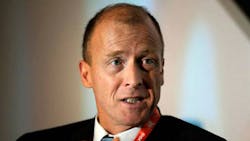Boeing and Airbus 'Fight Like Hell' for Aerospace Engineers
The race to sell airliners, particularly between Airbus and Boeing, is creating cutthroat competition in the aerospace industry to recruit engineers.
There is a worldwide shortage of people with the qualifications needed by the companies gearing up to meet demand for an estimated 20,000 aircraft in the next 20 years.
Toulouse, France-based Airbus SAS, for example, is using Twitter accounts to talk to potential recruits and plans to hold an international recruitment day on June 30, interviewing 100 candidates from 15 countries selected from more than 6,500 applicants.
Tom Enders, CEO of Airbus parent EADS NV (IW 1000/56), noted that "the pool of talents in Europe at least has clearly become too small."
Airbus says that of 12,000 jobs available in the sector in Europe last year, only 9,000 were filled.
At Chicago-based Boeing Co. (IW 1000/49), human resources executive Rick Stephens told AFP that the United States produced 72,000 to 74,000 engineering graduates a year, but "we don't see enough students completing engineering degrees to be able to fill what we believe will be the needs" of the aerospace industry.
Thierry Baril, his counterpart at Airbus and EADS, said: "We must fight like hell on the international market to get the best talents."
When Boeing closes a factory -- as it did this year in Wichita, Kan. -- putting engineers on the market, "everybody pounds after them, Airbus and Bombardier," Baril said. "It's a little war for talent."
Problem for Subcontractors
Still, the biggest companies say they're able to leverage their brand names to recruit top talent, but worry about problems encountered by their subcontractors.
These companies can become weak links in the production chain when Boeing and Airbus increase their output.
Thierry Voiriot, president of small and medium-size businesses in the French aerospace industries association GIFAS, said "engineers are more attracted by the big names and think that in these companies there will be more opportunities for development."
This problem is exacerbated if big groups use headhunting firms to try to attract engineers away from the smaller companies, he said, adding, however, that such behavior is the exception.
In general, the big manufacturers have a policy of trying to ensure that the entire industry will be supplied adequately with engineers in the next few years.
Boeing's Stephens said that the U.S. industry has been taking this approach for the last three years.
"We all agreed that we would help create a large talent pool and then we could go and fight for them," he said.
Firms in the sector work with schools and universities to help draw up programs that meet the future needs of the industry.
Airbus and Brazil-based Embraer SA (IW 1000/644) run their own engineering schools.
"We have our own school in Sao Paulo," said Luiz Fuchs, president of Embraer Aviation Europe. "This has been a very successful program where we attract people who have no possibility perhaps to go university. So we develop them, we pay attention to them, and we put them on the market.
Turning to Hollywood for Help
There also is a drive to raise the image of the engineer.
Lutz Bertling, the chief executive of civil-helicopter manufacturer Eurocopter, which is part of the Airbus group, gives presentations in universities to attract students. He is himself an engineer.
Boeing has been working for a year with the film industry in Hollywood to improve the image of engineers, who often are cast in a bad light, Stephens said.
Commenting on competition for engineers with information technology firms such as Google or Apple, Stephens said: "They are great-paying jobs. You get more engineers doing better in aerospace than you may in the IT field."
Boeing and Airbus also recruit on the international market.
Stephens said that Boeing, which does an increasing share of its business abroad, needs to attract talented people outside the United States.
Airbus takes it a step further. Of 4,000 people whom Airbus will recruit this year, 90% will be hired in Europe and the rest in India, the United States, China and Russia, EADS's Baril said.
Enders noted that Airbus will open an innovation unit in India to be managed by an Indian.
Copyright Agence France-Presse, 2012
About the Author
Agence France-Presse
Copyright Agence France-Presse, 2002-2025. AFP text, photos, graphics and logos shall not be reproduced, published, broadcast, rewritten for broadcast or publication or redistributed directly or indirectly in any medium. AFP shall not be held liable for any delays, inaccuracies, errors or omissions in any AFP content, or for any actions taken in consequence.
